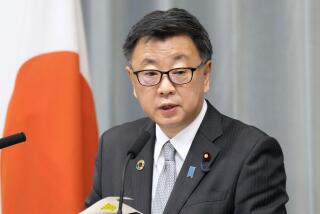Iraq Assails Japan Over Its Gulf Aid : Diplomacy: Baghdad’s envoy warns that transport planes sent to the region will be considered ‘a military target.’
- Share via
TOKYO — Iraq declared Thursday that it now considers Japan to be a “hostile” nation, reacting to a Tokyo decision that could redirect Japanese diplomacy that for 45 years has focused mainly on economics.
The Iraqi statement was provoked by Prime Minister Toshiki Kaifu’s decision earlier in the day to supply military cargo aircraft for transportation of refugees in the Middle East and to add $9 billion to its financial support of the United States and its allies in the Persian Gulf War.
Iraq’s ambassador to Japan, Rashid Rifai, called a news conference to assert: “From now on, Japan also will be responsible for every drop of blood, every destruction that is caused in Iraq.” Rifai added that Iraq will consider any military transport aircraft that Japan sends to the gulf region “a military target.”
Japan’s sending of planes would be its first deployment of military aircraft overseas since the end of World War II.
In Washington, State Department spokeswoman Margaret Tutwiler praised Japan’s latest pledge, saying it demonstrated Tokyo’s “strong support for the efforts of the United States and the United Nations.”
Until Thursday, Japan had insisted that its major international foreign aid contributions be restricted to economic assistance. But the new commitment of $9 billion for non-lethal military spending nearly equals the level of Japan’s regular yearly foreign aid, highest in the world in monetary terms. In 1989, for instance, Tokyo’s foreign economic aid totaled $9.1 billion.
Until Thursday, Japan also had insisted that its constitution forbids sending military forces overseas and any “collective security” actions on behalf of other countries.
Kaifu refused to concede that his government is changing its interpretation of the constitution.
But Tsuruo Yamaguchi, secretary general of the opposition Socialist Party, called the decision to send C-130 military transports to the Middle East an “extralegal challenge to the Japanese people.” The $9-billion boost in the aid commitment, Yamaguchi added, also is contrary to the constitution.
But another opposition body, the middle-of-the road Komei (Clean Government) Party, stopped short of condemning the $9-billion pledge. A high government official disclosed that Kaifu’s ruling Liberal Democrats had secretly agreed to meet a Komei demand that the additional $9 billion in military support not be used to buy weapons or ammunition.
Thus, the new $9-billion commitment will have strings attached, just as did Japan’s $2-billion pledge last September to the allied Persian Gulf buildup.
Officially, however, Chief Cabinet Secretary Misoji Sakamoto would say only that Japan will “consult” with the United States and its allies on use of the new funds.
Kaifu’s party was bound to listen to Komei’s demands because it needs that Buddhist-backed party’s 20 votes in the upper house of Parliament, where the Liberal Democrats lack a majority, to pass enabling legislation.
Foreign Ministry spokesman Taizo Watanabe conceded that Komei had demanded that the new aid not be used for lethal purposes and added: “We have gone through all the necessary groundwork before making (this) commitment.” He said that “large funding” is needed for “many areas of logistic support.”
Kaifu said his government will submit its second supplementary budget for the fiscal year ending March 31 to authorize the new funds. No decision, however, was made on what taxes would be raised.
To ensure that the funds are made available by March 31--before revenue from higher taxes can begin to flow into the treasury--the government will issue short-term national bonds, officials in the prime minister’s office said.
Kaifu telephoned President Bush on Thursday to tell him about the decision. Bush called the action “extremely, extremely vital” and said it would be “highly evaluated by international society and well received by the American people and American congressmen,” according to a Japanese diplomat.
Watanabe said military aircraft would be dispatched to ferry refugees from such points as Amman, Jordan, to Cairo “only if there is a need for them,” but he added, “We will be ready to send them when the need is confirmed.”
Japan Air Lines and All-Nippon Airways, meanwhile, agreed to charter four planes to the Japanese government to pick up refugees in Cairo and transport them back to their own countries. The first three charters, which will ferry 962 Vietnamese to Ho Chi Minh City, will leave Tokyo today, Saturday and Monday, the government announced.
Staff writer Norman Kempster in Washington contributed to this story.
More to Read
Sign up for Essential California
The most important California stories and recommendations in your inbox every morning.
You may occasionally receive promotional content from the Los Angeles Times.













